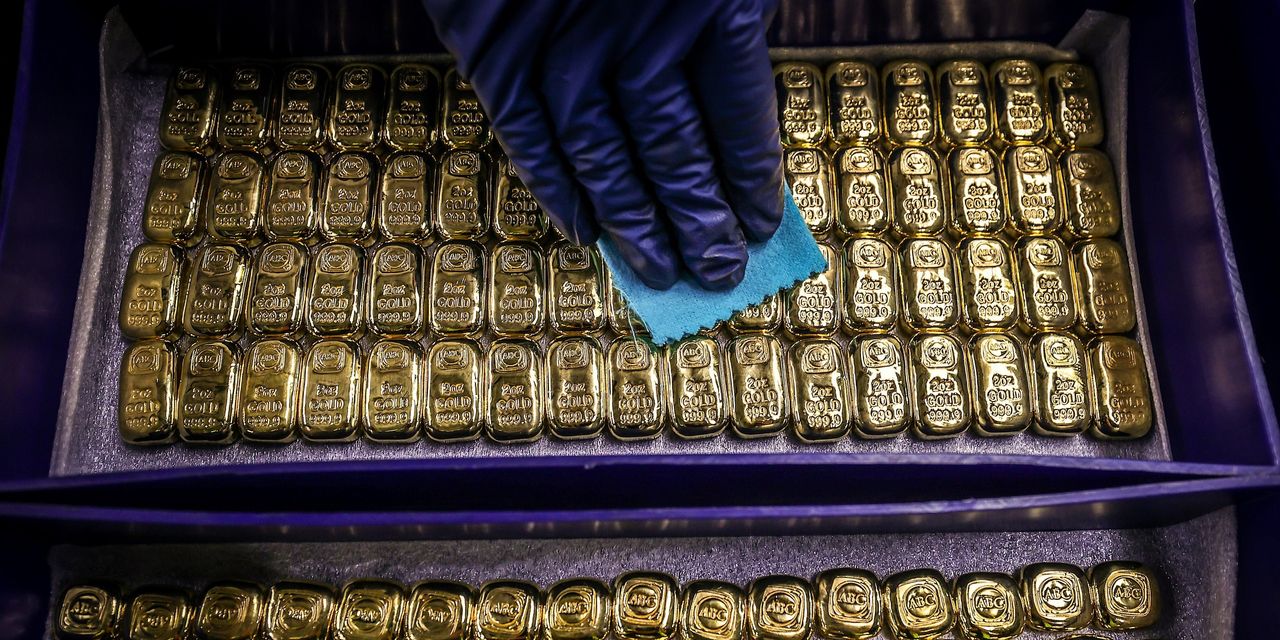Gold futures settled Thursday at their highest since late July, recovering from a brief session dip in prices as investors looked to remarks from Federal Reserve Chairman Jerome Powell for hints on the central bank’s plan for interest rates.
In remarks to the Economic Club of New York Thursday, Powell said inflation is still to high and “a few months of good data” are only the beginning of what is needed to bring inflation back to 2%.
The Fed is “attentive to recent data showing the resilience of economic growth and demand for labor,” he said. Additional evidence of “persistently above-trend growth, or that tightness in the labor market is no longer easing, could put further progress on inflation at risk and could warrant further tightening of monetary policy.”
Powell seemed to offer some comments for “both the bulls and bears in his speech and interview today,” Brien Lundin, editor of Gold Newsletter, told MarketWatch.
For gold, investors thought he pointed toward the Fed standing pat on rates “unless they saw a major uptick in inflation,” he said. “But his warnings against doing ‘too little’ struck fear into the hearts of equity and bond bulls.”
Gold for December delivery
GC00,
GCZ23,
settled at $1,980.50 an ounce on Comex, up $12.20, or 0.6%. The most-active futures contract had traded as low as $1,963.80 amid Powell’s remarks Thursday, which began around 12 noon Eastern time, then prices sharply rebounded, according to Dow Jones Market Data.
Prices settled Thursday at their highest since July 31, which was also the last time prices ended a session above $2,000.
Read: Forget stocks! Gold enjoys a moment over the past year as it hurtles toward $2,000
“What is counteracting Powell’s remarks is the demand for gold as a safe haven asset during arguably the most uncertain geopolitical situation in recent memory: wars in Ukraine and the Middle East, chilly relations with China, and a dysfunctional Congress,” said Edmund Moy, senior IRA strategist for U.S. Money Reserve and a former director of the U.S. Mint, told MarketWatch.
Read: What Israel-Hamas war means for gold as investors seek safety
Gold futures look to end the week higher for a second straight week, following three consecutive weekly losses.
“The bottom line is that the markets are trendless right now, with what we had come to accept as positive correlations turning into inverse correlations, and vice versa, from day to day,” said Lundin.
“” When gold posts strong gains in the face of rising rates, it hints at a significant turning point in the markets, and one that will be fundamentally positive for gold.” ”
“Beyond the geopolitical risks, there are fundamental developments that are now coming to the fore,” he said.
Fundamentally, the issue is the surge in interest rates and Treasury yields because of over-supply, said Lundin.
Read: Why stock-market investors are fixated on 5% as 10-year Treasury yield nears key threshold
The U.S. Treasury is “force-feeding a mountainous supply of new paper — thanks to an exploding deficit, a tsunami of existing Treasuries rolling over, and a backlog of issuance from the latest debt-ceiling brinksmanship — into a market devoid of its usual buyers,” he explained. “Not only are other sovereigns reducing their Treasury purchases, but so is the Fed (who was the primary buyer).”
Those willing to buy now are “only willing to do so with a higher rate of return, to compensate for the greater risk due to all the supply,” said Lundin. Gold is benefitting because that greater supply of Treasury securities means more dollars being created, and also because of “the greater risk that all this entails.”
So “when gold posts strong gains in the face of rising rates, it hints at a significant turning point in the markets, and one that will be fundamentally positive for gold,” he said.
Read the full article here







